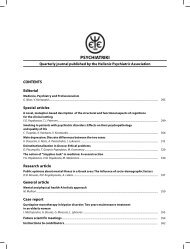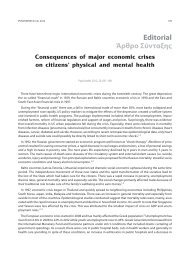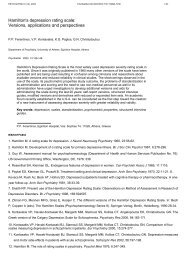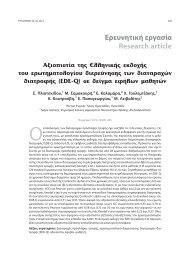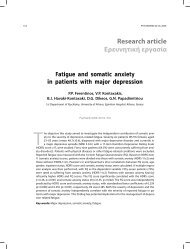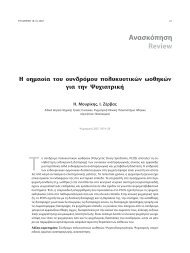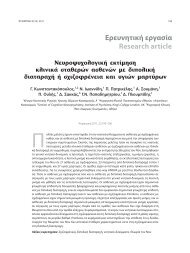Πλήρες Τεύχος - Ελληνική Ψυχιατρική Εταιρεία
Πλήρες Τεύχος - Ελληνική Ψυχιατρική Εταιρεία
Πλήρες Τεύχος - Ελληνική Ψυχιατρική Εταιρεία
Create successful ePaper yourself
Turn your PDF publications into a flip-book with our unique Google optimized e-Paper software.
PSYCHIATRIKI 22 (4), 2011 PROBLEMS IN DETERMINING EFFICACY AND EFFECTIVENESS OF ANTIDEPRESSANTS 303depressants, with a total of 5044 SSRI-treated patients,and failed to detect any clinically significant differencein efficacy between SSRIs and TCAs (Geddes et al2003). Another Cochrane Collaboration meta-analysisinvestigated the tolerability and efficacy of the TCAamitriptyline in comparison with other antidepressantsand SSRIs, and found no difference in overallefficacy between amitriptyline and either other TCAsor the SSRI comparators, but tolerability and acceptabilitymeasures favoured SSRIs. 50 An almost classicalexample is the meta-analysis by Anderso. 51 whichcomprised 102 randomised controlled trials including10.706 patients. Overall, no difference in efficacywas found between SSRIs and TCAs; however, TCAsseemed to be more efficacious than SSRIs in inpatients.Regarding tolerability, Anderson looked at95 randomised controlled studies including a totalof 10,553 patients. The SSRIs were described to bebetter tolerated than the TCAs, with a significantlylower overall rate of treatment discontinuations andof treatment discontinuations due to side-effects, althoughthis did not apply to fluvoxamine. A CochraneCollaboration review identified 136 randomised trialsin which SSRIs and TCAs were compared among depressedpatients, and found a modest but significantdifference favouring SSRIs in terms of discontinuationof treatment. 52Recent meta-analyses and reviews focussing on selectiveserotonin/noradrenalin reuptake inhibitors likevenlafaxine, duloxetine and milnacepran, as well ason the noradrenergic and specific serotonergic antidepressantmirtazapine, gave hints towards a superiorefficacy of these so-called "dual" antidepressants incomparison to SSRIs. But the results were inconsistent.53,54 Surprisingly, also the SSRI escitalopram, theactive s-enantiomer of the racemat citalopram, wasfound to be more effective than the racemat in equivalentdoses, hypothetically explained 55 by the inhibitingeffect of R-citalopram at an allosteric transporterbinding sector. 56–65With tolerability as such an important issue (especiallyin relation to effectiveness), when it comes tothe question of whether SSRIs are preferable to TCAs,also the results of the meta-analyses of Trindade etal 66 shall be mentioned in short. Trindade et al comparedthe side-effect profile of SSRIs and TCAs metaanalytically.Eighty-four comparative studies wereincluded. In this meta-analysis many adverse eventsoccurred statistically more often with at least one ofthe included SSRIs than with TCAs, namely nausea,"anorexia", diarrhoea, insomnia, nervousness, anxietyand agitation (which indicate the typical SSRI side effectprofile). The SSRI-associated adverse effects seemto be related to drug dose, since they may reflect afunctional increase in central 5-HT activity or 5-HTsensitivity. The TCAs are closely associated with medicallymore relevant adverse events like postural hypotension,cardiac conductance disturbances, glaucomaand urinary retention. These are not reflected in thisand other meta-analyses because they refer primarily/only to rating scale data which do not include thesekinds of side effects. It should be considered that thelatter described side effects are of much greater clinicalimportance and medical relevance than the SSRIassociatedsymptoms described above. 48 Taking intoconsideration the recently approved antidepressantagomelatine it has to be stated that this AD is apparentlythe one with the lowest rate of any side effects. 67Differences related to suicidality can not be discussedhere due to space reasons; the reader will find respectivepapers in the literature. 68–70Cipriani et al 71 recently performed a so-called "multiple-treatment"meta-analysis (indirect meta-analysis)which enabled them to describe a full picture ofthe different efficacy/tolerability profiles of single antidepressants,even if, for example, drug B was neverdirectly tested against drug C, but both only againstdrug A. Based on a comparison of 12 new-generationantidepressants, the authors came to the conclusionthat, considering both efficacy and non-discontinuation(as proxy for acceptability) escitalopram is themost preferable drug, followed by sertraline. Takingprice issues into account sertraline was eventuallyplaced first rank because this medication costs lessthan escitalopram. However, this meta-analysis didnot include placebo arms of controlled studies which,together with other methodological issues, are consideredproblematic 72 (table 1).Apart from differences based on clinical evaluationsand respective meta-analyses brain imaging can helpus to gain additional insight into the different effectsof antidepressants in terms of brain functioning andnetworks involved. 73 This might be a future way fora better understanding of the differences in efficacyand effectiveness of antidepressants.




